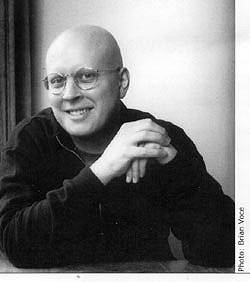Dark Inventions, the latest addition to NMC's invaluable series of contemporary
British composers, is enthralling from first note to last. Although Dark
Inventions is not the first track, its title (which serves for the CD
as a whole) strikes an immediate resonance with the bass clarinet and double
bass heard in the opening gestures of Chamber Concerto (1995) for
16 instruments. This virtuosic, fleet-footed composition, which embraces
references to 'a host of 20thC. figures' (Nicholas Williams) reflects
Philip Cashian's studies in Wales, London & USA. With fifteen
clearly demarcated brief sections, some of them genuinely fast (a pity not
to have indexed them on the CD for study) and a superlative ear for instrumental
timbre and combinations, it is a winner.

I would describe Cashian as an accessible post-modernist, his approach described
by Williams as combining process and natural instinct, adopting what suits
him from many sources. One composer whose apparent influence and finger prints
are conspicuously present to me listening to this CD is Luis de
Pablo, [
profile ; review
] the eminent composer and teacher of most younger Spanish composers,
but I am reasonably certain that this is coincidental and no more than an
example of the international spread of contemporary musical languages.
In the 1992 Dark Inventions and elsewhere Reich's influence is inescapable
in hammering repeated notes, but the imaginative instrumental scoring is
Cashian's own, and he is no dogmatic minimalist. Blue circus (1990/91)
puts its clarinet soloist (Mark van de Wiel) through the hoops 'fast to very
fast', with heterophonic accompaniment for vibraphone and one each of the
four string instruments, a unique conception. … in the still hours
for string ensemble (1995) is a restful interlude, with an expressive
solo for the cellist Ulrich Heinen. Musica Meccanica (1994) for violin
and piano follows, a compelling fast-slow-fast sequence of three pieces,
the last with a jagged ostinato, winding down to finish quietly with
violin harmonics, brilliantly realised by Lyn Fletcher and Sally Bishop.
Finally, powerful evocations of solitary rail travel in settings of Louis
MacNeice, So lonely for voice and string quartet, sung with exemplary
clarity by Mary King.
Despite its variety (five years can be a long time in a young composer's
development) this CD easily holds the attention played straight through,
and it will be one to come back to. With NMC's usual meticulous production
standards, full documentation and fine recording in Birmingham by Mike Clements,
at mid-price, this is an unmissable purchase recommendation.
Reviewer
Peter Grahame Woolf

Philip Cashian's 1st String Quartet is included on
NMC D006 and his work with amateurs and
children is represented in the NMC/Associated Board
Spectrum
NMC D057
.
